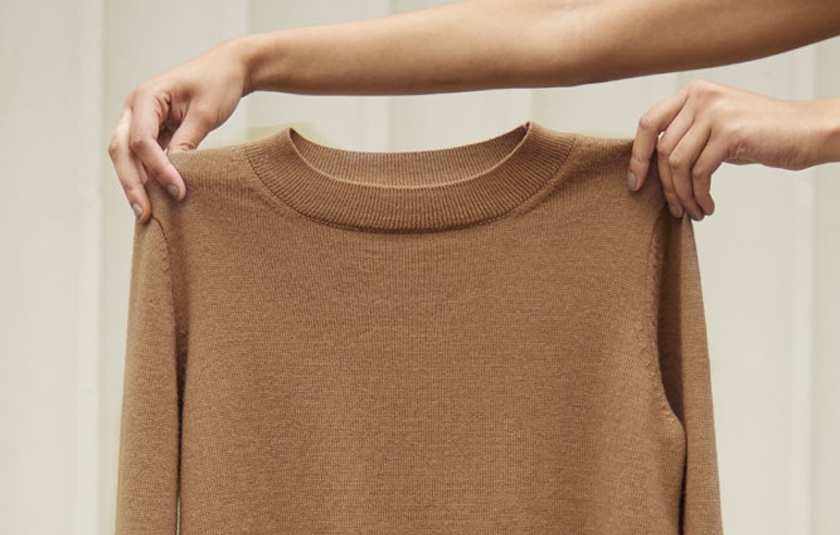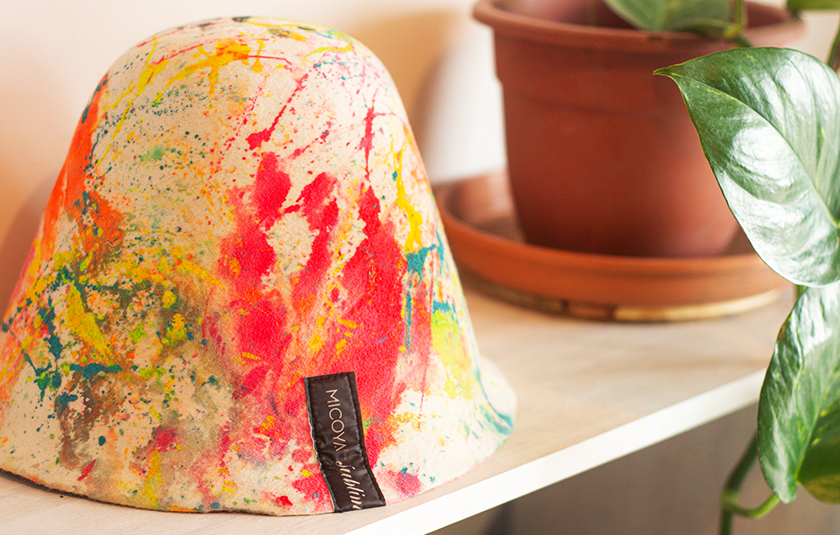The transformative power of slow fashion has forged a deeper meaning with Selera, a young yet timeless fashion brand rooted in the yarn of Ukrainian resilience.
As I ruminate and ramble on about the inherent value of timeless design one day, my fashion-savvy friend stops me mid-sentence with a glint in her eye. “Oh, have you heard about that Scottish-Ukrainian slow fashion brand?” Immediately, my curiosity is piqued. I find myself typing their website into my phone: S-E-L-E-R-A.

For the last two decades, slow fashion has been in and out of favour, fighting against an industry that relies on turnover, trends, profit and polyester.
It seems almost rebellious that this brand is based in Aberdeen, Scotland’s northeastern port city that gained its prosperity from the oil and gas industry. Yet, the more I delve, I discover Selera was stitched from a deeply personal story with heart.
Having spent years working in the fashion industry, Ukrainian stylist and designer Valeriia Semchuk was appalled by the waste and toxicity she witnessed in producing short-lived garments. In 2020, she decided to reclaim the more artisanal, time-honoured approach to fashion by founding Selera, a brand rooted in what it calls “circular design, radical transparency and soulful creation – in harmony with nature.”

Using deadstock fabrics – surplus, unused textiles that usually come from leftover stock, either due to overordering or production runs ending due to the end of a season – from European mills, she developed a small upcycled clothing collection. What this means is that each design has limited quantities.
“Using resale and upcycling gives garments extended life cycles,” Valeriia Semchuk explains.
As the designer reveals, Selera was not a fashion brand solely about aesthetics, but was built intentionally as “a deliberate alternative to fast, disposable clothing.”
By using deadstock textiles, the brand estimates that it preserves 70% more water than new fabric production, while also reducing landfill. Less, in this case, really is more.

Another goal for Valeriia Semchuk was to ensure that Selera prioritised robust, long-lasting clothing, which meant focusing on premium natural fabrics, such as wool, 100% cotton or linen. Naturally, these durable yet biodegradable textiles are easier to recycle.
Even the packaging reflects the brand’s ethos of merging beauty with responsibility: you won’t find any laminated labels here. Instead, you’ll find the clothes tags are biodegradable and plantable, a subtle yet powerful message that we can all revitalise our natural world, rather than take away from it.
Long-life versatility
Valeriia Semchuk actively encourages her customers to buy less, but better quality, much like the global grassroots Slow Food movement that inspired this Slow Fashion ideology.
A major consideration in Valeriia Semchuk’s design philosophy is ensuring garments are timeless and minimalist in form, so that styles are not only elegant but stay relevant for years to come.

“There’s no chasing mass market momentary seasonal trends,” Valeriia Semchuk explains. “Every garment should have a meaning, a story, and a long life.”
Another fascinating feature of Selera’s collection is that garments are ‘transformable’ – so they can be worn in multiple ways and dressed up or down depending on the occasion.
I recall the first time I discovered transformable garments. In 2006, Dr Bernice Pan showed me around her versatile and functional collection at her innovative atelier, Deploy London. Almost two decades later, I am amazed that this concept still hasn’t reached the mainstream, even with visionaries like Bernice and Valeriie showing how possible – and desirable – it is. I am sure most practical people will be drawn to saving wardrobe space, or being able to dash from the office to after-work drinks without having to carry a tote bag of extra clothes with them.
Reclaiming my love for tartan
Valeriie Semchuk fled Kyiv in March 2022 after Russia’s invasion of the Ukrainian capital, and is now one of over a thousand Ukrainians who adopted Aberdeen as a place of refuge. She still has half her family back home.

In the few years since, Selera has built a bridge between the two countries: the apparel is stitched at workshops in Ukraine that guarantee fair pay, while embroidery are managed by local partners in Scotland.
As a woman displaced from her home country, Valeriie Semchuk was recognised for her entrepreneurial resilience in building a successful, sustainable Ukrainian business from scratch when she won the Visa Everywhere Pioneers 2025 Award.
Selera is now a symbol for Ukrainian creativity and resilience – and adaptability. Much like Valeriie Semchuk, who wears everything she designs, this young fashion label has embraced the culture of its new home, forging a new collective memory.
One such example is the showcasing of pure wool Scottish tartan in Selera’s latest limited collection.
Living in the Scottish Highlands, I have developed an awkward fatigue towards anything vaguely tartan. I put it in the same bucket as golf courses, malt whisky, and excessive campervans on single-track roads.
 Until now, there have only ever been two exceptions to my odd tartan aversion: The first is the historic muted Harris Tweed® pure virgin woven cloth produced in the Outer Hebrides, while the other is the statement pieces crafted by Scottish designer Judy Clark, who uses tartan as an innovative embellishment.
Until now, there have only ever been two exceptions to my odd tartan aversion: The first is the historic muted Harris Tweed® pure virgin woven cloth produced in the Outer Hebrides, while the other is the statement pieces crafted by Scottish designer Judy Clark, who uses tartan as an innovative embellishment.
Yet, somehow, Selera has managed to further inspire in me a new admiration for this famous Scottish pattern.
I no longer think of my high school violin teacher and her garish tartan skirt and saggy tan-tights, but instead celebrate all its contemporary possibilities.

For example, in Selera’s collection, you will find a luxury Tartan Maxi Skirt, beautifully tailored from deadstock fabric (50% wool, 50% cotton). It boasts not only the signature ‘every occasion’ appeal, but also an all-season versatility with the way it can be worn – you can wear it as a standalone skirt or, ideal for the long Scottish winter, over trousers or leggings.
To me, this elegant skirt exemplifies just how transformable fashion can be – not only in how it’s worn but also in how it can be cherished by the wearer and contribute to a more resilient world.
Selera has received the Sublime Good Brand Award 2025 in the Fashion & Style category, honouring its dedication to sustainability, conscious production and timeless design.













